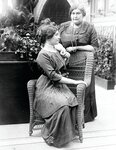

“MISS HELEN KELLER THE BLIND AND DEAF WONDER, AND HER TEACHER MRS. MACY (THE FORMER MISS ANNE SULLIVAN) BEFORE GREAT AUDIENCE,” read the Doylestown Democrat headlines on Oct. 28, 1913. Assembled by the County Teacher’s Institute, the crowd was said to be one of the largest ever in the Bucks County Court House auditorium.
Lester Trauch wrote in 1968, “Hundreds of people literally rushed the doors. When calm was restored chairs were put on the judge’s bench and in the aisles but there was not even standing room. The attorney’s room was filled with men and women standing on chairs.”
The Democrat reported that Mrs. Macy told of her 26-year history with Helen. At the age of 19 months, the infant became deaf and blind, the result of an unknown illness (perhaps rubella or scarlet fever). As Helen grew she became wild and unruly, and Anne became her teacher when the girl was about 6 years of age. She was first able to communicate with her through Helen’s love for her doll. Helen was remarkably intelligent and learned to both read (braille) and write within six months. Having no memory of sight or speech, Helen discovered that her teacher communicated using her lips; and she expressed a desire to learn to talk. It took eight years for Anne Macy to bring Helen’s speech to the point where she could be generally understood.
At the conclusion of Mrs. Macy’s address Miss Keller spoke and her message was one of cheer. She said her imagination enabled her to enjoy the beautiful sunset as keenly as those favored with vision; and although deaf, there was keener development of her other senses. Following her address, questions were repeated by Mrs. Macy and communicated through Miss Keller’s hand, which she placed upon Mrs. Macy’s throat, lips and nose. In response, Miss Keller stated emphatically that she was a suffragette and gave her reasons. She said she could hear the applause of the audience through vibrations in her feet. She said she knew a large audience was before her through a sense of abundant life in the atmosphere. When asked her favorite poet, she replied, “Walt Whitman because he is the poet of the democracy of the future.”
NOTE: The story of Helen Keller and Anne Sullivan was told in Keller’s book, Teacher: Anne Sullivan Macy, and later in the play “The Miracle Worker,” which appeared on Broadway, television and movie theaters. A stamp issued in 1980 commemorated the 100th anniversary of Keller’s birth.
Doylestownhistorical.org
Join our readers whose generous donations are making it possible for you to read our news coverage. Help keep local journalism alive and our community strong. Donate today.